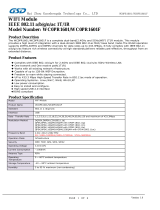The host product manufacturer is responsible for compliance to any other FCC rules that apply to the host not covered by
the modular transmitter grant of certification. If the grantee markets their product as being Part 15 Subpart B compliant
(when it also contains unintentional-radiator digital circuity), then the grantee shall provide a notice stating that the final
host product still requires Part 15 Subpart B compliance testing with the modular transmitter installed.
2.11 The host manufacture is recommended to use D04 Module Integration Guide recommending as "best practice" RF
design engineering testing and evaluation in case non-linear interactions generate additional non-compliant limits due
to module placement to host components or properties.
2.12
This module is stand-alone modular. If the end product will involve the Multiple simultaneously
transmitting condition or different operational conditions for a stand-alone modular transmitter in a
host, host manufacturer have to consult with module manufacturer for the installation method in end
system.
Canada Statement
This device complies with Industry Canada’s license-exempt RSSs. Operation is subject to the following two conditions:
(1) This device may not cause interference; and
(2) This device must accept any interference, including interference that may cause undesired operation of the device.
Le présent appareil est conforme aux CNR d’Industrie Canada applicables aux appareils radio exempts de licence.
L’exploitation est autorisée aux deux conditions suivantes :
(1) l’appareil ne doit pas produire de brouillage;
(2) l’utilisateur de l’appareil doit accepter tout brouillage radioélectrique subi, même si le brouillage est susceptible d’en
compromettre le fonctionnement.
Please notice that if the ISED certification number is not visible when the module is installed inside another device, then
the outside of the device into which the module is installed must also display a label referring to the enclosed module. This
exterior label can use wording such as the following: “Contains IC: 12290A-DT3A” any similar wording that expresses the
same meaning may be used.
l'appareil hôte doit porter une étiquette donnant le numéro de certification du module d'Industrie Canada, précédé des mots
« Contient un module d'émission », du mot « IC: 12290A-DT3A» ou d'une formulation similaire exprimant le même sens,
comme suit
The device for operation in the band 5150-5250 MHz is only for indoor use to reduce the potential for harmful interference
to co-channel mobile satellite systems
for devices with detachable antenna(s), the maximum antenna gain permitted for devices in the band 5725-5850 MHz shall
be such that the equipment still complies with the e.i.r.p. limits as appropriate;
Les dispositifs fonctionnant dans la bande 5150-5250 MHz sont réservés uniquement pour une utilisation à l’intérieur afin
de réduire les risques de brouillage préjudiciable aux systèmes de satellites mobiles utilisant les mêmes canaux;
pour les dispositifs munis d'antennes amovibles, le gain maximal d'antenne permis (pour les dispositifs utilisant la bande de
5 725 à 5 850 MHz) doit être conforme à la limite de la p.i.r.e. spécifiée, selon le cas;
The device meets the exemption from the routine evaluation limits in section 2.5 of RSS 102 and
compliance with RSS-102 RF exposure, users can obtain Canadian information on RF exposure and
compliance.
Le dispositif rencontre l'exemption des limites courantes d'évaluation dans la section 2.5 de RSS 102 etla conformité à
l'exposition de RSS-102 RF, utilisateurs peut obtenir l'information canadienne surl'exposition et la conformité de rf.
This transmitter must not be co-located or operating in conjunction with any other antenna or
transmitter. This equipment should be installed and operated with a minimum distance of 20
centimeters between the radiator and your body.








